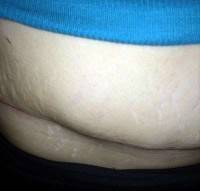Tummy tuck weight
Whenever I evaluate a patient for an abdominoplasty, I use a patients’s weight in addition to other physical characteristics to determine if they are a good candidate for the tummy tuck procedure.
It is always preferable to have someone at their target weight and have them stable there for 3-6 months. This gives the best chance to achieve lasting results postoperatively.
Weight fluctuations between 4-6 pounds are usually not critical but 10-15 pound difference can effect your end result. This operation provides such a great body contour change that it is desireable to maximize your chance of success. (Ronald H. Stefani Jr, MD, Chicago Plastic Surgeon)
Weight and tummy tuck
It is best to reach and maintain your goal weight prior to undergoing a tummy tuck. However, only you can know whether this is realistic for you. It also depends on how much more weight you plan to lose because, obviously, the larger the weight loss, the more it can affect the result. (Robert L. Kraft, MD, New York Plastic Surgeon)
Lose Weight Before Tummy Tuck
If you believe that you truly can reach your ideal weight prior to undergoing a tummy tuck, you should definitely do so. This will result in the best chances for an excellent result. I often perform tummy tucks on patients who are still much heavier than their ideal weight, however, with dramatic improvement.
If you should weigh 50 pounds less than you do currently, for example, but know from years of experience that you realistically will not reach that ideal weight, then a tummy tuck is still possible. Many of my patients find it much easier to lose weight AFTER undergoing a tummy tuck, decreasing to weights that they never could achieve prior to surgery. To summarize, you should try to achieve your ideal weight prior to a tummy tuck if at all possible; if not, do your BEST to lose what you can, then have your tummy tuck. (Andres Taleisnik, MD, Orange County Plastic Surgeon)
Some people cannot lose as much as they want to and would still benefit from the procedure. I believe that being at your goal weight. Or as close as you can get. Would be an ideal timing for your Abdominoplasty (Sanjay Lalla, MD, FACS, West Orange Plastic Surgeon)
It depends on what your current weight and body mass index (BMI) are, what your goal weight/BMI is, what your ideal body weight/BMI is, what your abdomen looks like, what sort of improvement can be expected from abdominoplasty, what your future pregnancy plans are, how successful weight loss efforts are expected to be, and multiple other factors.
My custom and practice is to evaluate each situation individually, and engage in constructive dialog and planning to help every patient seeking my help to achieve their desired outcome and quality of life. By the shortest route. (Steve Laverson, MD, San Diego Plastic Surgeon)
You should try and be at your goal weight before any body contouring surgery. If you are able to maintain a goal weight for several months prior to surgery, the chance of significant fluctuations after surgery are lower. Thus, the results of your surgery will be long-lasting. (Naveen Setty, MD, Dallas Plastic Surgeon)
There is a relationship between weight (actually it’s better to say Body Mass Index) and the rate of complications and results. Typically, the closer you are to your goal weight – the better the results. (Aldo Guerra, MD, Scottsdale Plastic Surgeon)
For the very best cosmetic result, it would be great if you were at your goal weight, ( or close to it) at the time of your surgery. (Robert E. Zaworski, MD, Atlanta Plastic Surgeon)








